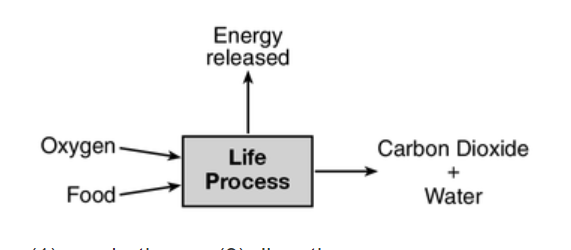Hypothesis
prediction that can be tested
the process by which plants make their own food (glucose); occurs in the chloroplasts in plant cells only
Photosynthesis
Metabolism
a set of chemical reactions that occur in the cells of living organisms to sustain life
Structures that make proteins in cells
Ribosomes
Correctly order the following:
Tissues, Organ system, Cell, Organ, Organism, Organelles
Organelles, Cells, Tissues, Organs, Organ Systems, Organism
Inference
a conclusion based on observation
Specific protein that speed up chemical reactions in living things
Enzyme
A chemical substance produced in the body that controls and regulates the activity of certain cells or organs
Hormone
Control center of the cell which directs all cell activities and contains DNA which the the instructions for making proteins.
Nucleus
Which life process carried out by a green plant is represented in the diagram below?

Respiration
the variable in the experiment that you measure throughout the experiment
Dependent Variable
Movement of substances from an area of high concentration (where there are more) to an area of low concentration (where there are less)
A self-regulating process by which an organism tends to maintain stability while adjusting to conditions
Homeostasis
Chloroplasts
Found only in plant cells, this green structure capture light energy to produce food (glucose) during the process of Photosynthesis
Explain the difference between positive and negative feedback
Positive feedback: a change in one direction causes a greater response in the same direction,
Negative feedback: a change in one direction causes a change in the opposite direction, canceling out the change.
the one variable in the experiment that you change for the experimental groups
Independent Variable
Multicellular Organism
Nervous System
Gathers and interprets informations; responds to information
Structures containing enzymes that extract energy from glucose in order to make the usable form of energy (ATP) that cells run during the process of Cellular Respiration.
Mitochondria
Explain why messages sent from the nervous system are considered to be specific
The shape of the neurotransmitter matches the shape of the receptor (just like enzymes and substrates)
a carefully thought-out explanation for observations about the natural world that has been constructed using the scientific method
Theory
the process by which all living things make ATP energy. Occurs in the mitochondria
Cellular Respiration
Immune System
Fights off foreign invaders in the body
Vacuole
What are the 8 characteristics of Living Things
1. be made of cells
2. has the ability to reproduce
3. has DNA or RNA
4. can grow and develop
5. obtain energy
6. Respond to the environment
7. Maintain stable internal environment (homeostasis)
8. Changes over time (evolve)